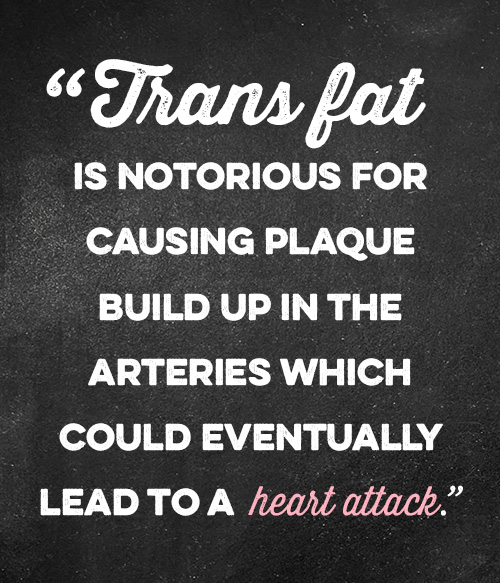Most of us know by now that not all fats are treated equally. The good fats are found in real, whole food, such as peanut butter, avocados and olive oils. Artificial trans fats, the byproduct of partially hydrogenated oils (PHOs), have been used for decades to add texture and taste to popular food items, as well as extend shelf life. As of last month, after being shunned by health foodies and nutritionists alike, trans fats got the official “adios” from The Food and Drug Administration (FDA).
So, what does that mean for you? Well, The FDA is giving the food industry three years to remove trans fats found in common products, such as as french fries, store-bought frosting and microwave popcorn, deeming it, “unsafe for consumption.”
Though a small amount of trans fats can be found naturally in some red meats and dairy, it’s the artificial version that can be truly dangerous. Even though PHOs have been around awhile, most commonly found in shortening and margarine, the snack industry jumped on the trans fat train in the ’80s and ’90s, using hydrogenated oil to increase the shelf life of their products, as well as add some flavor and texture to an otherwise flat-tasting snack food. Yuck!
 Simply put, trans fats are linked to heart disease. They have been shown to cause plaque build up in the arteries, and raise bad cholesterol while lowering good cholesterol, which can lead to serious heart problems and type 2 diabetes. One study released last year even noted that a diet high in trans fats could be linked to memory loss.
Simply put, trans fats are linked to heart disease. They have been shown to cause plaque build up in the arteries, and raise bad cholesterol while lowering good cholesterol, which can lead to serious heart problems and type 2 diabetes. One study released last year even noted that a diet high in trans fats could be linked to memory loss.
Trans fats peaked in the late ’90s, when the move toward healthier options had just begun, which is when the awareness for the large amount consumed by the U.S. population was brought to the surface. As consumers slowly began to cut back, brands took notice and started phasing out the once popular ingredient. In fact, the FDA states that between 2003 and 2012, the consumption of trans fats declined by 78%. That’s a huge drop, so it’s no wonder brands took notice.
The first step toward regulation came about in 2006, when the FDA required the trans fat content in food products to be stated on labels. By then, companies were already searching for alternatives to replace PHOs.
Now that the FDA has set a complete ban, how will it impact our everyday food choices?
It probably won’t, truth be told. While trans fats are still out there, they’re not nearly as prevalent as they were in their prime. With the ban having been in the works for a while now, food manufacturers have been phasing out trans fats by adjusting their ingredients accordingly.
The most interesting aspect of this “war against trans fats,” is that The FDA didn’t fully step in until the consumers made an impact. It really was a grassroots movement, done by educating people about the dangers of trans fats and the amount in which we consume them. When companies saw their bottom lines being affected, they started to make adjustments. The FDA’s ban just makes it official. But be warned – trans fat may still linger. As of right now, if a food product contains 0.5 grams of trans fat, it can be rounded down to 0. All it takes is a few servings, and your trans fat consumption is way higher than it should be – and you wouldn’t even know it. On top of that, companies can still petition the FDA to include PHOs in their products.
So what can we do? Read those labels. Even if a label states 0% trans fat, check the ingredients for any partially or fully hydrogenation oils, or other refined oils (like soybean, cottonseed, or canola), artificial flavors, or emulsifiers like mono- and diglycerides.
While it’s not perfect, the FDA has at least taken a step toward healthier food choices. After all, it’s estimated that with these strict new regulations in place, the savings from reduced medical care over the next 20 years could be around $130 billion. Talk about a big impact!
Want more health hacks and wellness insights? We got you covered. You'll also receive a code for 15% off your first order!

